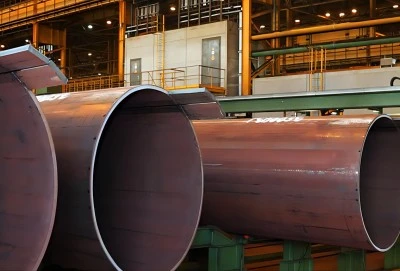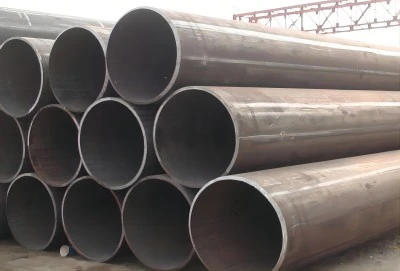Straight seam welded pipes have revolutionized modern pipeline systems across various industries, from oil and gas transmission to water distribution networks and industrial processing facilities. These pipes, manufactured through a sophisticated welding process along a single longitudinal seam, offer remarkable advantages that have made them increasingly popular in industrial applications worldwide. Their widespread adoption stems from a combination of technical superiority, economic benefits, and manufacturing efficiency that consistently delivers reliable performance in demanding environments. Understanding these advantages is crucial for engineers, contractors, and industry professionals involved in pipeline projects, as they directly impact project success, long-term reliability, and overall system performance. The continuous advancement in welding technology and materials science has further enhanced the capabilities of straight seam welded pipes, making them an indispensable component in modern infrastructure development.
|
|
|
High Strength And Pressure Resistance:
The exceptional strength characteristics of straight seam welded pipes emerge from their unique manufacturing process, which combines advanced metallurgy with precise welding control systems. Through advanced welding technologies, particularly Electric Resistance Welding (ERW) and Submerged Arc Welding (SAW), these pipes develop superior mechanical properties that often exceed industry standards. The controlled heating and cooling during the welding process creates a refined grain structure in the weld zone, contributing to enhanced strength properties that ensure long-term durability. Research conducted by leading metallurgical institutes has demonstrated that properly manufactured straight seam welded pipes can achieve tensile strengths comparable to or exceeding those of seamless pipes in many applications, with some studies showing strength improvements of up to 15% in certain grades.
The pressure resistance capabilities of straight seam welded pipes are particularly noteworthy and have been extensively documented through rigorous testing programs. Modern manufacturing techniques ensure uniform wall thickness and consistent material properties along the entire length of the pipe, achieved through sophisticated control systems that monitor and adjust processing parameters in real-time. The weld seam, often considered a potential weak point, undergoes rigorous quality control measures including ultrasonic testing, radiographic inspection, and magnetic particle examination. These comprehensive testing protocols ensure that each pipe meets or exceeds the specified pressure ratings. Advanced welding technologies have enabled these pipes to routinely demonstrate impressive burst pressure ratings, often exceeding 1.5 times the design pressure, making them suitable for high-pressure applications across various industries including oil and gas, chemical processing, and water transmission.
Cost-Effectiveness For Long Pipelines:
The economic advantages of straight seam welded pipes become especially apparent in large-scale pipeline projects, where material and installation costs significantly impact project viability. The manufacturing process allows for efficient material usage and faster production rates compared to seamless pipe alternatives, with modern production lines capable of producing up to 100 meters of pipe per hour under optimal conditions. The steel coil or plate used in production can be precisely selected to match project requirements, minimizing material waste through optimized cutting patterns and efficient material utilization strategies. Industry studies have shown that straight seam welded pipes can offer cost savings of 15-30% compared to seamless pipes without compromising on quality or performance, making them an increasingly attractive option for large-scale infrastructure projects.
Transportation and installation costs also contribute significantly to their cost-effectiveness across the project lifecycle. The consistent dimensional accuracy and straightness of these pipes facilitate easier handling and alignment during installation, reducing labor costs and installation time by up to 25% compared to alternative pipe types. The reduced weight per unit length, achieved through optimized wall thickness design and advanced steel grades, results in lower transportation costs and easier on-site manipulation. These factors combine to create significant cost benefits, particularly in projects requiring extensive pipeline networks. Additionally, the standardized manufacturing process allows for better inventory management and reduces the need for specialized handling equipment, further contributing to overall project cost savings.
Ease Of Production And Material Optimization:
The manufacturing process of straight seam welded pipes incorporates sophisticated automation and control systems that ensure consistent quality while maintaining high production efficiency. Modern production lines utilize advanced forming techniques and real-time monitoring systems that allow for precise control over pipe dimensions and properties throughout the manufacturing process. The ability to adjust manufacturing parameters in real-time ensures optimal material utilization and reduces production waste, while maintaining strict adherence to quality standards. Computer-controlled forming operations and automated welding systems maintain precise dimensional control, resulting in pipes with superior roundness and straightness tolerances.
Material optimization extends beyond just efficient use of raw materials, encompassing the entire production chain from steel selection to final testing. The production process allows for the incorporation of specific steel grades and compositions tailored to end-use requirements, with advanced metallurgical control ensuring consistent mechanical properties. This flexibility enables manufacturers to produce pipes with enhanced properties such as improved corrosion resistance, better weldability, or increased toughness, all while maintaining cost-effectiveness. Modern production facilities employ sophisticated quality control systems that monitor every aspect of the manufacturing process, from raw material inspection to final product testing, ensuring consistent quality and performance characteristics.
Enhanced Welding Precision And Reliability:
Modern straight seam welding technology has achieved remarkable precision through the implementation of automated welding systems and advanced quality control measures that exceed traditional manufacturing capabilities. Computer-controlled welding parameters ensure consistent weld quality throughout the entire length of the pipe, with real-time monitoring systems adjusting welding parameters to maintain optimal conditions. The use of multiple inspection methods, including real-time monitoring systems, ultrasonic testing, and radiographic examination, ensures that weld integrity meets or exceeds industry standards. Advanced welding technologies, such as narrow-gap welding and dual-sided welding processes, have further improved weld quality while reducing heat input and minimizing distortion.
The reliability of straight seam welded pipes is further enhanced by comprehensive testing protocols that evaluate every aspect of pipe performance. Each pipe undergoes a series of non-destructive tests, including ultrasonic inspection, magnetic particle testing, and hydrostatic pressure testing, with results documented and validated against international standards. These quality assurance measures have contributed to the excellent service record of straight seam welded pipes in demanding applications, with field studies showing failure rates significantly lower than industry averages. The implementation of automated inspection systems and digital quality control measures ensures consistent compliance with specifications while providing complete traceability throughout the manufacturing process.
LONGMA GROUP Straight Seam Welded Pipe:
For organizations seeking a reliable straight seam welded pipe supplier, LONGMA GROUP offers expert consultation and support through their contact channel at info@longma-group.com. Their technical team provides comprehensive assistance in selecting the most appropriate pipe specifications for specific project requirements, supported by detailed technical documentation and performance data. The company maintains extensive inventory levels and can accommodate both standard and custom orders, with flexible production scheduling to meet urgent project needs. Their commitment to customer service extends beyond the sale, with ongoing technical support and documentation assistance available throughout the project lifecycle.














